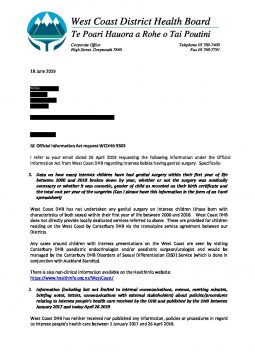RE Official Information Act request WCDHB 9303
I refer to your email dated 26 April 2019 requesting the following information under the Official Information Act from West Coast DHB regarding Intersex babies having genital surgery. Specifically:
1. Data on how many intersex children have had genital surgery within their first year of life between 2000 and 2018 broken down by year, whether or not the surgery was medically necessary or whether it was cosmetic, gender of child as recorded on their birth certificate and the total cost per year of the surgeries (Can I please have this information in the form of an Excel spreadsheet)
West Coast DHB has not undertaken any genital surgery on intersex children (those born with characteristics of both sexes) within their first year of life between 2000 and 2018. West Coast DHB does not directly provide locally dedicated services referred to above. These are provided for children residing on the West Coast by Canterbury DHB via the transalpine service agreement between our Districts.
Any cases around children with intersex presentations on the West Coast are seen by visiting Canterbury DHB paediatric endocrinologist and/or paediatric surgeon/urologist and would be managed by the Canterbury DHB Disorders of Sexual Differentiation (DSD) Service (which is done in conjunction with Auckland Starship).
There is also non-clinical information available on the HealthInfo website: https://www.healthinfo.org.nz/WestCoast/
2. Information (including but not limited to internal communications, memos, meeting minutes, briefing notes, letters, communications with external stakeholders) about policies/procedures relating to intersex people’s health care received by the DHB and published by the DHB between January 2017 and today April 26 2019
West Coast DHB has neither received nor published any information, policies or procedures in regard to intersex people’s health care between 1 January 2017 and 26 April 2018. 9(2)(a)
West Coast DHB has neither received nor published any information, policies or procedures in regard to intersex people’s health care between 1 January 2017 and 26 April 2018. 9(2)(a)
Please refer to the Canterbury DHB response to your request (CDHB 10091) regarding the work on improving services for gender diverse people, currently underway through the Canterbury Clinical Network. West Coast DHB will work with Canterbury DHB and adopt a localised version of this model.
I trust that this satisfies your interest in this matter.
Please note that this response, or an edited version of this response, may be published on the West Coast DHB website after your receipt of this response.

